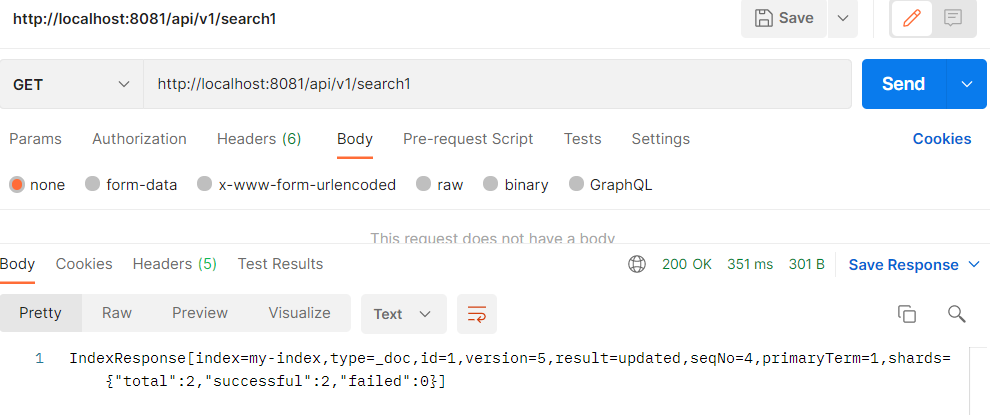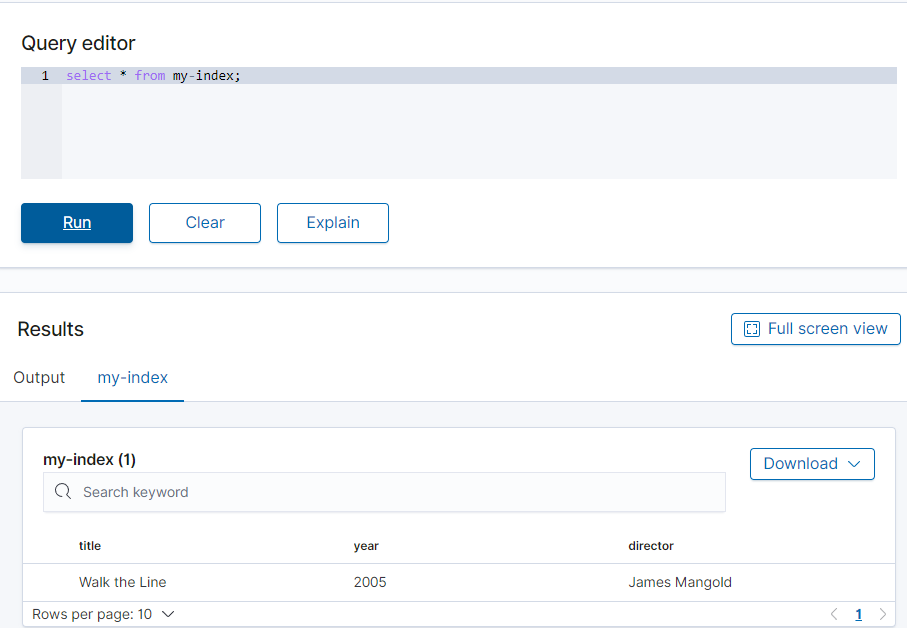🧙♂️
Spring Boot + Aws OpenSearch(Elasticsearch) 연동
March 15, 2022
✅ 개요
AWS 의 OpenSearch에 접근하여 데이터를 생성해보자.
Aws OpenSearch(Elasticsearch) 관련 포스팅은 여기를 참고하자
AWS OpenSearch 연동
기본 프로젝트 구조
infra
ㄴaws
ㄴAWSRequestSigningApacheInterceptor
controller
ㄴDataCheckController - 의존성 추가
dependencies {
implementation group: 'org.opensearch.client', name: 'opensearch-rest-high-level-client', version: '1.2.4'
}- AWSRequestSigningApacheInterceptor 추가
/**
* An {@link HttpRequestInterceptor} that signs requests using any AWS {@link Signer}
* and {@link AWSCredentialsProvider}.
*/
public class AWSRequestSigningApacheInterceptor implements HttpRequestInterceptor {
/**
* The service that we're connecting to. Technically not necessary.
* Could be used by a future Signer, though.
*/
private final String service;
/**
* The particular signer implementation.
*/
private final Signer signer;
/**
* The source of AWS credentials for signing.
*/
private final AWSCredentialsProvider awsCredentialsProvider;
/**
*
* @param service service that we're connecting to
* @param signer particular signer implementation
* @param awsCredentialsProvider source of AWS credentials for signing
*/
public AWSRequestSigningApacheInterceptor(final String service,
final Signer signer,
final AWSCredentialsProvider awsCredentialsProvider) {
this.service = service;
this.signer = signer;
this.awsCredentialsProvider = awsCredentialsProvider;
}
/**
* {@inheritDoc}
*/
@Override
public void process(final HttpRequest request, final HttpContext context)
throws HttpException, IOException {
URIBuilder uriBuilder;
try {
uriBuilder = new URIBuilder(request.getRequestLine().getUri());
} catch (URISyntaxException e) {
throw new IOException("Invalid URI" , e);
}
// Copy Apache HttpRequest to AWS DefaultRequest
DefaultRequest<?> signableRequest = new DefaultRequest<>(service);
HttpHost host = (HttpHost) context.getAttribute(HTTP_TARGET_HOST);
if (host != null) {
signableRequest.setEndpoint(URI.create(host.toURI()));
}
final HttpMethodName httpMethod =
HttpMethodName.fromValue(request.getRequestLine().getMethod());
signableRequest.setHttpMethod(httpMethod);
try {
signableRequest.setResourcePath(uriBuilder.build().getRawPath());
} catch (URISyntaxException e) {
throw new IOException("Invalid URI" , e);
}
if (request instanceof HttpEntityEnclosingRequest) {
HttpEntityEnclosingRequest httpEntityEnclosingRequest =
(HttpEntityEnclosingRequest) request;
if (httpEntityEnclosingRequest.getEntity() == null) {
signableRequest.setContent(new ByteArrayInputStream(new byte[0]));
} else {
signableRequest.setContent(httpEntityEnclosingRequest.getEntity().getContent());
}
}
signableRequest.setParameters(nvpToMapParams(uriBuilder.getQueryParams()));
signableRequest.setHeaders(headerArrayToMap(request.getAllHeaders()));
// Sign it
signer.sign(signableRequest, awsCredentialsProvider.getCredentials());
// Now copy everything back
request.setHeaders(mapToHeaderArray(signableRequest.getHeaders()));
if (request instanceof HttpEntityEnclosingRequest) {
HttpEntityEnclosingRequest httpEntityEnclosingRequest =
(HttpEntityEnclosingRequest) request;
if (httpEntityEnclosingRequest.getEntity() != null) {
BasicHttpEntity basicHttpEntity = new BasicHttpEntity();
basicHttpEntity.setContent(signableRequest.getContent());
httpEntityEnclosingRequest.setEntity(basicHttpEntity);
}
}
}
/**
*
* @param params list of HTTP query params as NameValuePairs
* @return a multimap of HTTP query params
*/
private static Map<String, List<String>> nvpToMapParams(final List<NameValuePair> params) {
Map<String, List<String>> parameterMap = new TreeMap<>(String.CASE_INSENSITIVE_ORDER);
for (NameValuePair nvp : params) {
List<String> argsList =
parameterMap.computeIfAbsent(nvp.getName(), k -> new ArrayList<>());
argsList.add(nvp.getValue());
}
return parameterMap;
}
/**
* @param headers modeled Header objects
* @return a Map of header entries
*/
private static Map<String, String> headerArrayToMap(final Header[] headers) {
Map<String, String> headersMap = new TreeMap<>(String.CASE_INSENSITIVE_ORDER);
for (Header header : headers) {
if (!skipHeader(header)) {
headersMap.put(header.getName(), header.getValue());
}
}
return headersMap;
}
/**
* @param header header line to check
* @return true if the given header should be excluded when signing
*/
private static boolean skipHeader(final Header header) {
return ("content-length".equalsIgnoreCase(header.getName())
&& "0".equals(header.getValue())) // Strip Content-Length: 0
|| "host".equalsIgnoreCase(header.getName()); // Host comes from endpoint
}
/**
* @param mapHeaders Map of header entries
* @return modeled Header objects
*/
private static Header[] mapToHeaderArray(final Map<String, String> mapHeaders) {
Header[] headers = new Header[mapHeaders.size()];
int i = 0;
for (Map.Entry<String, String> headerEntry : mapHeaders.entrySet()) {
headers[i++] = new BasicHeader(headerEntry.getKey(), headerEntry.getValue());
}
return headers;
}
}- DataCheckController
@Slf4j
@RestController
@RequestMapping("/api/v1")
public class DataCheckController {
/**
* aws 가용 지역
*/
@Value("${cloud.aws.region.static}")
private String region;//ap-northeast-2 서울리전
@GetMapping(value = "/search1")
public String search1() throws IOException {
log.info("------------------------------------->search1");
RestHighLevelClient searchClient = searchClient();
// Create the document as a hash map
Map<String, Object> document = new HashMap<>();
document.put("title", "Walk the Line");
document.put("director", "James Mangold");
document.put("year", "2005");
log.info("------------------------------------->Map");
// Form the indexing request, send it, and print the response
IndexRequest request = new IndexRequest("my-index", "_doc", "1").source(document);
IndexResponse response = searchClient.index(request, RequestOptions.DEFAULT);
System.out.println("response=========>"+response.toString());
System.out.println("response Result=========>"+response.getIndex());
return response.toString();
}
private static String serviceName = "es";
private static String host = "";// e.g. https://search-mydomain.us-west-1.es.amazonaws.com 앤드포인트
static final AWSCredentialsProvider credentialsProvider = new DefaultAWSCredentialsProviderChain();
private RestHighLevelClient searchClient() {
log.info("------------------------------------->RestHighLevelClient");
AWS4Signer signer = new AWS4Signer();
signer.setServiceName(serviceName);
signer.setRegionName(region);
HttpRequestInterceptor interceptor = new AWSRequestSigningApacheInterceptor(serviceName, signer, credentialsProvider);
return new RestHighLevelClient(RestClient.builder(HttpHost.create(host)).setHttpClientConfigCallback(hacb -> hacb.addInterceptorLast(interceptor)));
}
}- 포스트맨 호출

- 키바나 확인

🌭마무리
위와 같이 springboot에서 OpenSearch(Elasticsearch)에 인덱스를 생성해주었고 확인까지 할수 있었다.
다음에는 OpenSearch(Elasticsearch)를 활용한 간단한 애플리케이션을 만들어 보자.